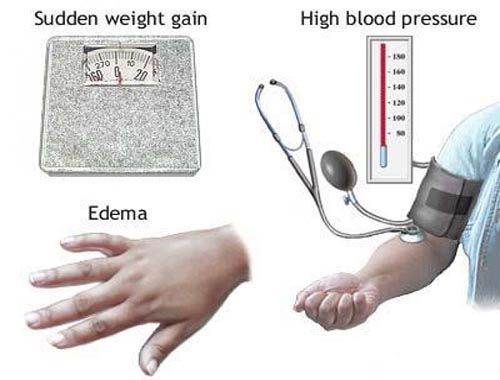Eclampsia

Published: 18 Jun 2025
ICD9: 642.60 ICD10: O15.9 ICD11: JA25
Eclampsia is a rare but severe complication of pregnancy characterized by seizures or coma in a pregnant woman who has already developed pre-eclampsia.
It's a life-threatening condition for both the mother and the baby.
Here's a breakdown:
![]() Preeclampsia: This is a condition that develops during pregnancy, usually after 20 weeks, and is characterized by:
Preeclampsia: This is a condition that develops during pregnancy, usually after 20 weeks, and is characterized by:![]()

![]() High blood pressure
High blood pressure![]()

![]() Protein in the urine (proteinuria)
Protein in the urine (proteinuria)![]()

![]() Sometimes, other signs of organ damage, such as liver or kidney problems.
Sometimes, other signs of organ damage, such as liver or kidney problems.
![]() Eclampsia: This is when preeclampsia progresses to include seizures or coma. It represents a critical escalation of the condition.
Eclampsia: This is when preeclampsia progresses to include seizures or coma. It represents a critical escalation of the condition.
Key Points:
![]() Cause: The exact cause of preeclampsia and eclampsia is unknown, but it's believed to involve problems with the placenta.
Cause: The exact cause of preeclampsia and eclampsia is unknown, but it's believed to involve problems with the placenta.
![]() Symptoms (beyond those of preeclampsia): The hallmark symptom is seizures or coma. Other symptoms preceding the seizures can include:
Symptoms (beyond those of preeclampsia): The hallmark symptom is seizures or coma. Other symptoms preceding the seizures can include:![]()

![]() Severe headache
Severe headache![]()

![]() Vision changes (blurred vision, seeing spots)
Vision changes (blurred vision, seeing spots)![]()

![]() Abdominal pain
Abdominal pain![]()

![]() Altered mental status
Altered mental status
![]() Treatment: The primary treatment for eclampsia is delivery of the baby, regardless of gestational age. Magnesium sulfate is also given to prevent further seizures. Other treatments focus on managing blood pressure and other complications.
Treatment: The primary treatment for eclampsia is delivery of the baby, regardless of gestational age. Magnesium sulfate is also given to prevent further seizures. Other treatments focus on managing blood pressure and other complications.
![]() Prevention: Regular prenatal care is crucial for monitoring blood pressure and urine protein levels, allowing for early detection and management of preeclampsia, which can help prevent eclampsia.
Prevention: Regular prenatal care is crucial for monitoring blood pressure and urine protein levels, allowing for early detection and management of preeclampsia, which can help prevent eclampsia.
![]() Risk Factors: Factors that increase the risk of preeclampsia (and therefore eclampsia) include:
Risk Factors: Factors that increase the risk of preeclampsia (and therefore eclampsia) include:![]()

![]() First pregnancy
First pregnancy![]()

![]() History of preeclampsia in a previous pregnancy
History of preeclampsia in a previous pregnancy![]()

![]() Chronic hypertension
Chronic hypertension![]()

![]() Kidney disease
Kidney disease![]()

![]() Diabetes
Diabetes![]()

![]() Multiple gestation (twins, triplets, etc.)
Multiple gestation (twins, triplets, etc.)![]()

![]() Obesity
Obesity![]()

![]() Age over 35 or under 20
Age over 35 or under 20
Why is it dangerous?
Eclampsia can cause severe complications, including:
![]() Stroke
Stroke
![]() Brain damage
Brain damage
![]() Aspiration pneumonia
Aspiration pneumonia
![]() Pulmonary edema (fluid in the lungs)
Pulmonary edema (fluid in the lungs)
![]() HELLP syndrome (a severe form of preeclampsia affecting the liver and blood)
HELLP syndrome (a severe form of preeclampsia affecting the liver and blood)
![]() Placental abruption (separation of the placenta from the uterine wall)
Placental abruption (separation of the placenta from the uterine wall)
![]() Preterm labor
Preterm labor
![]() Fetal growth restriction
Fetal growth restriction
![]() Fetal death
Fetal death
![]() Maternal death
Maternal death
Because of the serious risks, any pregnant woman experiencing symptoms of preeclampsia or eclampsia needs immediate medical attention.